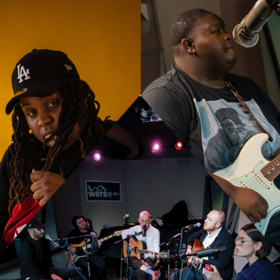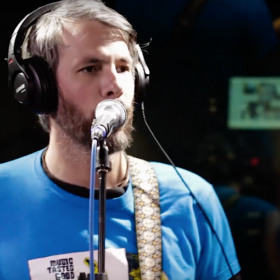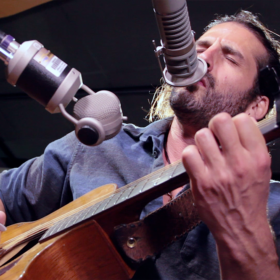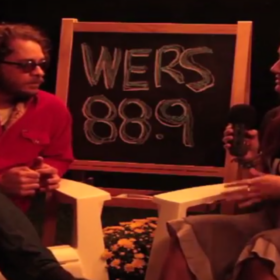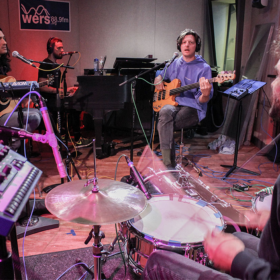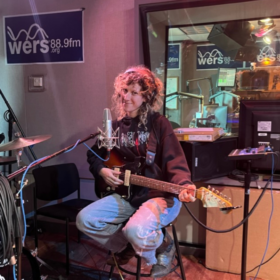
By Mason Standish, Staff Writer
To celebrate Black Music Month, we brought back our Vault of Soul series by spotlighting a soul artist every Friday of June. Stepping inside the vault, you can discover the life and legacy of some of the world's greatest soul artists, both past and present. This month we spotlighted Mavis Staples, Dionne Warwick, and Quincy Jones. Now, for the final installment of the month, we are excited to take a deep dive into Ray Charles' incredible life and career.
BIOGRAPHY
Ray Charles Robinson, regarded by many as "The Genius of Soul," was born September 1930 in Albany, Georgia. Coming up in an extremely impoverished household, Charles' mother had no choice but to take up a string of laborious jobs to pay for the essentials. This in combination with Charles' father leaving the family for another woman shortly after his birth made him deeply devoted to his mother. At the age of four, Ray would begin to lose his eyesight as a result of glaucoma.
His musical curiosities were initially piqued at Wylie Pitman's Red Wing Cafe, a restaurant and jazz club that Ray's family was briefly living in. One night the club's owner played some simple songs and chords on an upright piano for Ray. The owner would later go on to help Ray learn the basics of piano technique. Around this time, Ray fully lost his eyesight, leading him to be enrolled at Florida School for the Deaf and Blind. It was here that he would fully realize his passion for piano while playing during his music classes. He went on to stay at the school from 1937 to 1945 until the death of his mother. This event proved to be extremely traumatizing for young Ray. His mother's passing led him to unenroll in school at the age of fourteen to pursue music.
MAKING A NAME FOR HIMSELF
Now residing in Jacksonville, Florida he began his search for work. Charles' talent and confidence in his musical abilities helped pave the way for performance opportunities and small paid gigs. His lack of income, however, essentially forced him into picking up various small jobs around the city. Through working and performing, Charles met McKee and Milton Garret. Their shared passion for music led to the creation of the McSon Trio. Their fun, soulful, sound garnered the public's attention. Soon, Charles was offered work arranging music for some of the biggest artists at the time such as Cole Porter and Dizzy Gillespie.
Charles later signed with Swing Time Records, quickly recording two of his biggest hits "Baby, Let Me Hold Your Hand" and "Kissa Me Baby." The following year, however, he would switch record labels from Swing Time to Atlantic Records. The move opened the door for Ray Charles to become a mega-star. Here, Charles reached the pinnacle of his success with the release of his smash-hit blues album "What'd I Say."
A LASTING LEGACY
In June of 2004, Ray Charles passed away in his Beverly Hills home at the age of 72.
Today, Ray Charles' place in music legend is universally undisputed. From a six-time Academy Award-winning biopic to countless tribute tours and shows, Ray Charles' energy is still felt even almost 20 years after his death.
INFLUENCES
As a child, some of Charles' biggest musical influences were classical composers Beethoven, Johan Sebastian Bach, and Amadeus Mozart. Their pristine piano technique alongside their supernatural musical composition abilities was awe-inspiring and important towards Ray's musical development. In particular, Charles took a liking to Mozart, who he was first introduced to at the Florida School for the Deaf and Blind. Ray Charles and Mozart are unique in that both artists are missing one of their vital senses - sight for Charles and hearing for Mozart.
After beginning to book paid shows, Charles stated his biggest influence as Nat King Cole, a prominent American jazz singer and pianist. While still categorically separate, a clear similarity in both artist's showmanship is incredibly apparent.
WHO RAY CHARLES INFLUENCED
Although Ray Charles worked almost entirely within the soul and blues genre, his musical influence on others defies any singular genre. Artists ranging from Steely Dan to Kanye West have accredited Charles with being a clear influence to their music. Other notable musicians such as James Brown, Michael Jackson, The Everly Brothers, Billy Joel, and even The Zombies cite Charles as being the reason they even pursued playing music as a career in the first place.
In homage to Charles, many musicians will sample small pieces of his music as either easter eggs for keen listeners or unapologetic rips of full verses. Famously, Kanye West sampled one of Charles' biggest hits "I've Got A Woman" in his song "Gold Digger." This was important in that it showed Ray Charles' music continuously resonates with youthful generations decades after its release.
AWARDS WON
- Rhythm & Blues Performance (Grammys, 1961)
- Best Male Vocal Performance (Grammys, 1961)
- The Rock and Roll Hall of Fame (1986)
- Lifetime Achievement Award (Grammys, 1987)
- National Medal of Arts (1993)
- Best R&B Vocal Performance (Grammys, 1994)
- Kennedy Center Honors (1996)
- Polar Music Prize (1998)
- Album of the Year (Grammys, 2005)
SPOTLIGHT TRACKS
"I've Got a Woman" (1957)
Ray Charles proved himself to be a master of soul music time and time again. He famously would mix different genres and subgenres of music to create his own unique sound. This is evident in one of his quintessential tracks, "I've Got a Woman." Charles would typically integrate variations of gospel, pop, R&B, and country music. By mixing his sharp soulful vocals with swing-inspired, brassy, instrumentals Charles created a masterful piece of music that is still being enjoyed over 60 years following its release. "I've Got a Woman" has been featured in the form of sampling in many modern musical projects. It was featured in Dire Strait's song "Walk of Life" (1985) as well as Kanye West's popular song "Gold Digger" (2005).
"Hit The Road Jack" (1961)
Easily one of Charles' most well-known tracks, "Hit The Road Jack" remains as slick and timeless as ever. The song was first recorded as an acapella demo track meant to only be heard by music executives. However, once Charles got to professionally recording it the track quickly shot up to number one for two weeks on the Billboard Hot 100. The recording process of "Hit The Road Jack" is where Charles met Margie Hendrix, the mother of his first son. Hendrix sang backup vocals on many of Charles' projects and Charles would play piano on many of Hendrix's projects. The track also serves as another example of Charles utilizing genre-bending.
"Unchain My Heart" (1961)
One of Charles' early singles, "Unchain My Heart"'s clear Bossanova inspiration helps to further the personal messages that are littered throughout the track. Charles was no stranger to being honest, personal, and intimate with his audience. While he will always be remembered for his energetic presence, his more emotional songs also truly strike a chord with listeners. Charles often cited woes in his real love life when writing his music. "Unchain My Heart" was one of his biggest "love-gone-awry" songs. It went on to sit within the top 10 on the Billboard Hot 100 and be covered by dozens of artists including Trini Lopez, Joe Cocker, the Bobs and even the star of the television series "House," Hugh Laurie. It remains one of Charles' most played songs to date.
You can revisit past Vault of Soul articles here, featuring artists such as James Brown, Aretha Franklin, Marvin Gaye, and more.
Interested in exploring the Soul genre beyond the vault? Be sure to tune into 88.9 every night between 10 pm and 2 am for The Secret Spot. Let host D Danubian wind you up and simmer you down with a blend of R&B, Soul, and Slow Jams.
Also, be sure to check out ERS+, our new HD radio experience. Take a deep dive into R&B and Hip Hop with the legendary voices of Soul alongside new and pioneering MCs. Find ERS+: Boston's Black Experience online at WERSPlus.Org



